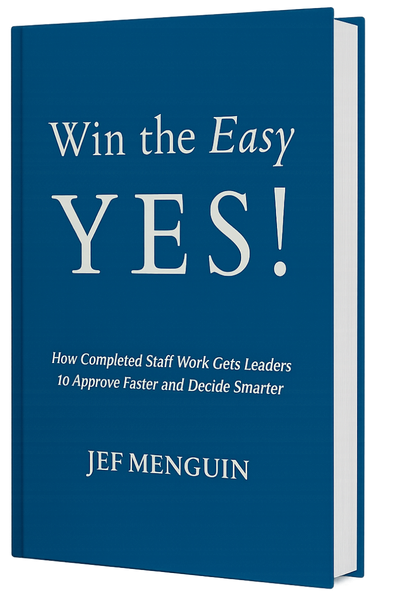“In CSW, almost right is 100% wrong. If you can’t stand by every detail, you’re not done.”
Verification is the cornerstone of Completed Staff Work. Every fact, every figure, every reference must be rock-solid. Here’s how to make sure your work is bulletproof.
1. Cross-Check Every Fact
No single source can be trusted completely. Real verification means confirming with multiple, independent sources. Imagine you’re citing a critical statistic for a proposal. One source says it’s accurate, but if you dig deeper, you may find different numbers elsewhere. By cross-referencing, you ensure that your data isn’t just a lucky guess but a confirmed fact.
Pro Tip: For key data points, always find at least two reliable sources. One source might be an anomaly; two means you’re on solid ground.
2. Assume Nothing—Confirm Everything
If it’s important, don’t assume it’s accurate. Even details that seem “obvious”—dates, statistics, names, quotes—often hide errors that can derail your work. For example, a quote might seem familiar, but even small inaccuracies can undermine credibility.
Pro Tip: Check every assumption, no matter how minor. The quickest way to undermine great work is to let unchecked details slip through.
3. Double-Check Numbers and Calculations
Numbers tell the story in CSW. A single error in your figures can turn solid analysis into a mess. Let’s say you’re working on a financial projection. One miscalculated figure could lead to costly decisions. Go back and check each calculation twice—accuracy is non-negotiable.
Pro Tip: Use tools like Excel formulas to automate calculations and minimize human error. Then, recheck manually to ensure nothing slipped through.
4. Verify Sources for Authority and Credibility
Just because it’s published doesn’t mean it’s reliable. Not all sources are created equal. Ask yourself, “Where did this information come from?” For instance, an industry expert’s report holds more weight than an unsourced blog post. Source quality matters just as much as the information itself in CSW.
Pro Tip: Always check the author’s credentials and the credibility of the publication. If they lack authority on the topic, seek out a more reputable source.
5. Fact-Check Dates, Names, and Titles
Small details—like a person’s title or the date of an event—can lead to big credibility gaps if they’re wrong. Imagine submitting a report with a key executive’s title listed incorrectly. It might seem minor, but it signals a lack of diligence. Great CSW ensures that every detail is exact.
Pro Tip: When referencing people or organizations, confirm their current title, spelling, and relevant details. This attention to detail reflects your commitment to accuracy.
6. Re-Read for Context
A quote or statistic might look accurate on its own, but without full context, it can be misleading. For example, a statistic showing a drop in sales might suggest trouble, but if you read the surrounding text, it could reveal that the decline was seasonal. Re-read the section it came from to ensure it supports your argument accurately.
Pro Tip: Copy and paste the full paragraph around any quote or stat you use. This ensures you’re interpreting it correctly and not cherry-picking data.
7. Validate Any Data Changes Over Time
When using historical data, make sure it’s still valid today. Economies shift, industries evolve, and what was accurate last year might not apply now. For example, market data from two years ago could misrepresent today’s trends, skewing your analysis.
Pro Tip: If data is older than two years, search for updated sources. Relying on outdated information can distort your conclusions.
8. Seek Out Conflicting Information
The best verification comes from questioning your own findings. Look for sources that challenge or contradict your data. If you can address opposing views, your case becomes even stronger. Let’s say you’re proposing a new strategy based on survey data; finding studies that offer a different view forces you to dig deeper and strengthen your argument.
Pro Tip: Actively search for the opposite perspective to stress-test your work. If it still holds up, you know you’ve done the legwork.
9. Confirm Quotes and Attributions
Quoting inaccurately or attributing a statement to the wrong person can erode trust immediately. Imagine misattributing a quote to a major figure in your report—it instantly signals unreliability. Every word you quote and every attribution must be precise.
Pro Tip: Double-check quotes with the original source, not a reprint. Ensure names, titles, and dates are spot-on.
10. Take One Last Look Before Submission
Once you’ve verified everything, give it one final sweep. Look at each point with fresh eyes. This last pass-through often catches minor errors that might otherwise slip through. Stepping back for even a few minutes before this final read can make a big difference in spotting overlooked details.
Pro Tip: Take a short break before your last review. Coming back with fresh eyes will help you notice errors you might have missed before.
Verification Is the Difference Between Good Work and Great Work
CSW demands accuracy, precision, and accountability.
Verifying your work isn’t just about double-checking details; it’s about building trust. Every fact-checked, every source confirmed, and every quote validated brings you closer to producing work that stands up to any scrutiny.
Verification transforms good work into great work. Verify, verify, verify—it’s the CSW way to make your work bulletproof.
